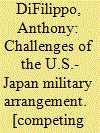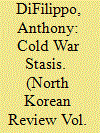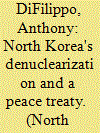| Srl | Item |
| 1 |
ID:
053943


|
|
|
|
|
| Publication |
New York, M E Sharpe, 2002.
|
| Description |
260p.
|
| Standard Number |
0765610183
|
|
|
|
|
|
|
|
|
|
|
|
Copies: C:1/I:0,R:0,Q:0
Circulation
| Accession# | Call# | Current Location | Status | Policy | Location |
| 046268 | 355.03109730952/DIF 046268 | Main | On Shelf | General | |
|
|
|
|
| 2 |
ID:
163826


|
|
|
| 3 |
ID:
091295


|
|
|
|
|
| Publication |
New York, Palgrave Macmillan, 2006.
|
| Description |
vi, 281p.
|
| Standard Number |
9781403974174
|
|
|
|
|
|
|
|
|
|
|
|
Copies: C:1/I:0,R:0,Q:0
Circulation
| Accession# | Call# | Current Location | Status | Policy | Location |
| 054398 | 355.033052/DIF 054398 | Main | On Shelf | General | |
|
|
|
|
| 4 |
ID:
106317


|
|
|
|
|
| Publication |
2011.
|
| Summary/Abstract |
This short paper examines the issue of the continued absence of a peace treaty to end the Korean War. Although the hostilities associated with the Korean War ended in 1953, it was the "temporary" Armistice Agreement and not a formal peace treaty that did this. After reviewing the history of discussions on a peace treaty, this paper focuses on the current North Korean nuclear issue. It demonstrates that a conditional peace treaty is a very pragmatic way to end the Korean War and to determine if Pyongyang, as it has stated repeatedly, wants to forsake its nuclear weapons, the programs it uses to produce them, and thus to denuclearize the Korean Peninsula. A conditional peace treaty, which effectively is win-win diplomacy for Washington and Pyongyang, will also improve the security environment in Northeast Asia and lay the political ground for improved relations between the two Koreas and between North Korea and Japan.
That no peace treaty was ever created to end the Korean War since the fighting was stopped by an armistice in 1953 has been one of the major sources of instability in Northeast Asia, where there still exists the very the palpable residual of the Cold War. The armistice was meant to end the hostilities on the Korean Peninsula only until a permanent peace treaty could be negotiated. More than a half century later, this has not happened. A peace treaty linked to North Korea's denuclearization gives the Obama administration a new and viable option with which to fundamentally change the security environment in Northeast Asia.
|
|
|
|
|
|
|
|
|
|
|
|
|
|
|
|